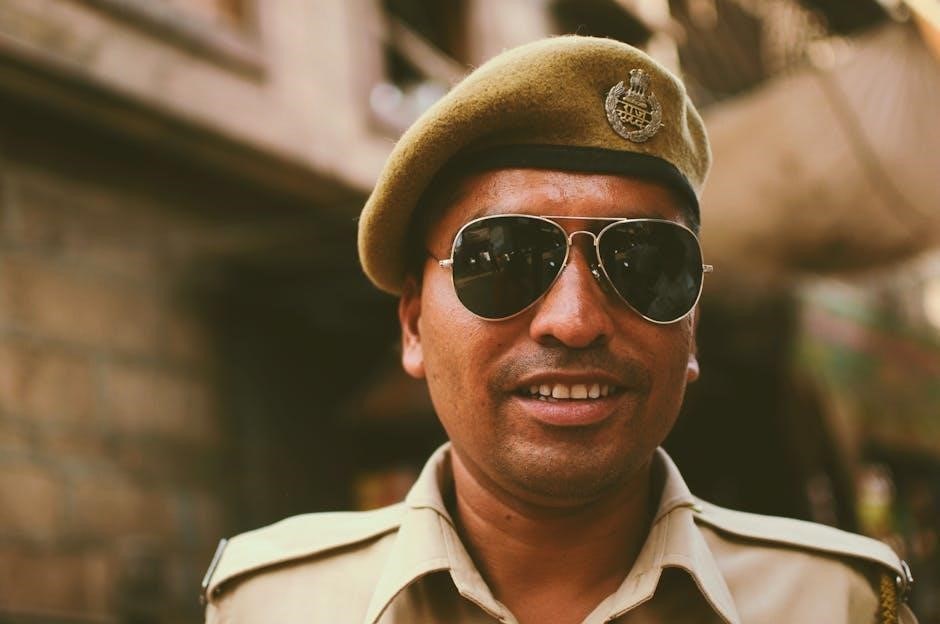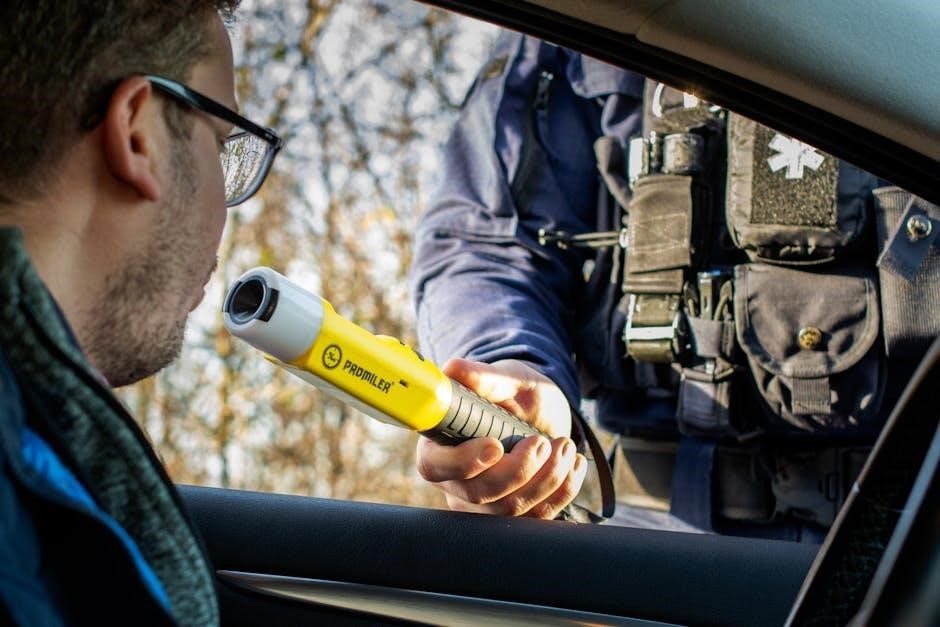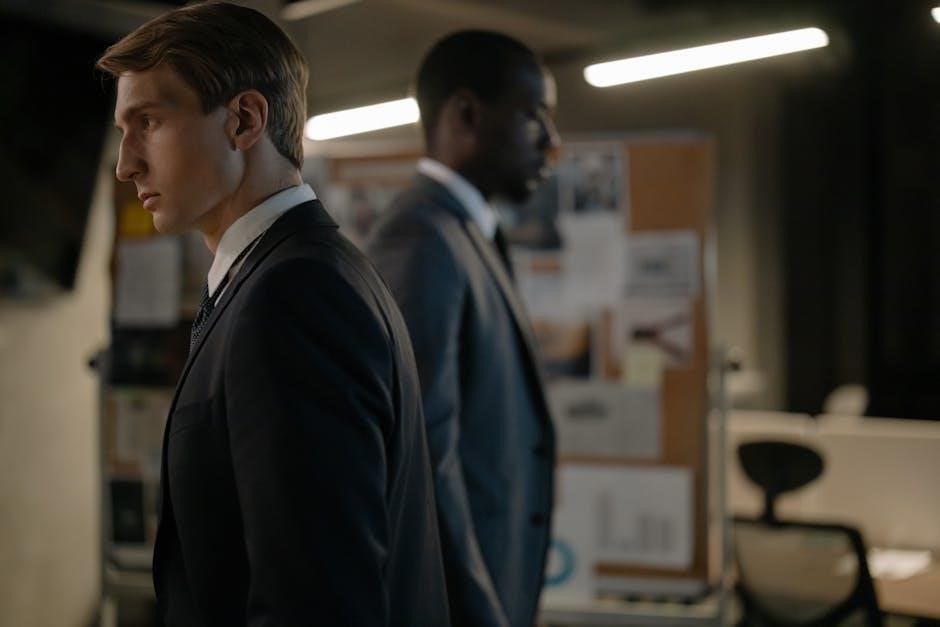police officer selection test study guide
Category : Guide
Becoming a police officer involves a rigorous, multi-step process designed to evaluate candidates’ skills, character, and suitability for law enforcement roles. Preparation is key to success.
Overview of the Selection Process
The police officer selection process is rigorous and multi-faceted, involving written exams, physical fitness tests, oral interviews, psychological evaluations, and background investigations. Each step assesses cognitive abilities, physical readiness, emotional stability, and personal integrity, ensuring only the most suitable candidates advance to serve in law enforcement roles.
Importance of Preparation
Preparation is crucial for success in the police officer selection process. It helps candidates understand the test format, improve time management, and reduce exam anxiety. Effective preparation builds confidence and enhances problem-solving skills, increasing the likelihood of a successful outcome. Adequate study ensures candidates are well-equipped to meet the rigorous standards required for law enforcement roles.

Understanding the Written Exam
The written exam assesses cognitive abilities, legal knowledge, and problem-solving skills. It includes multiple-choice questions and scenarios testing judgment and decision-making. Preparation with practice tests is crucial for success.
Sample Questions and Formats
Sample questions often include multiple-choice, true/false, and scenario-based formats. Topics range from law enforcement procedures to ethical dilemmas. Reviewing these examples helps candidates understand the test structure and content, enabling focused preparation. Practice tests are widely available, offering insights into typical question styles and formats, ensuring readiness for the actual exam experience.
Effective Study Strategies
Develop a structured study plan, focusing on weak areas. Utilize practice tests to familiarize yourself with exam formats. Regularly review notes and engage in active learning techniques. Stay mentally tough by setting realistic goals and maintaining a consistent routine. Prioritize understanding concepts over memorization for long-term retention and confidence.
Time Management Tips
Effective time management is crucial for success in the police officer selection test. Prioritize tasks, allocate specific study hours, and use timers for practice tests. Break study sessions into intervals with short breaks to maintain focus. Regularly review and adjust your schedule to ensure comprehensive preparation and minimize distractions for optimal performance.

Preparing for the Physical Fitness Test
Physical fitness is crucial for policing. Focus on building endurance through cardio exercises, strengthening muscles with resistance training, and maintaining a balanced diet for optimal energy.
Exercises to Improve Endurance
Endurance is crucial for police officers. Exercises like running, swimming, and cycling improve cardiovascular health. Incorporate interval training to boost stamina. Strength training also enhances muscular endurance. Consistency is key to achieving results. Avoid overtraining to prevent injuries and ensure peak performance during the physical fitness test.
Building Muscular Strength
Building muscular strength is crucial for police officers, as it enhances physical performance and injury prevention. Focus on compound exercises like squats, deadlifts, and bench presses. Incorporate resistance training 3-4 times a week, targeting major muscle groups. Ensure proper form to avoid injuries and gradually increase weights to build endurance and power over time.
Nutrition Advice for Optimal Performance
A balanced diet rich in proteins, complex carbs, and healthy fats fuels physical and mental performance. Stay hydrated with water, avoid sugary snacks, and opt for nutrient-dense meals. Timing and portion control are key to maintaining energy levels. Avoid extreme diets and focus on sustainable, whole-food choices to support endurance and recovery.

Acing the Oral Interview
The oral interview assesses your motivations, integrity, and lifestyle, conducted in two parts. Practice with common questions and focus on clear, confident communication to make a strong impression.
Common Interview Questions
Police officer interviews often include questions about motivation, ethical dilemmas, and personal experiences. Candidates may be asked, “Why do you want to become a police officer?” or “Describe a time you made a difficult decision.” Be prepared to discuss your values, problem-solving skills, and ability to work under pressure. Practice articulating your thoughts clearly and confidently.
Body Language and First Impressions
Body language plays a crucial role in making a positive first impression during the oral interview. Maintain good posture, make eye contact, and smile naturally. Avoid fidgeting or crossing arms, as these may signal nervousness or defensiveness. Use open, confident gestures and ensure your handshake is firm but not overly aggressive. Dress professionally to reflect respect for the process;
- Stand tall and avoid slouching.
- Nod to show engagement and attentiveness.
- Avoid negative gestures like crossing arms or legs.
First impressions are lasting, so present yourself as confident, approachable, and professional.
Structuring Responses Effectively
When answering interview questions, organize your thoughts clearly. Use the STAR method (Situation, Task, Action, Result) to provide concise, structured responses. Practice articulating your experiences and motivations, ensuring your answers align with the POST factors. Demonstrating clarity and confidence will help you present yourself as a strong, capable candidate for the role.

Navigating Psychological Evaluations
Psychological evaluations assess traits like integrity, decision-making, and emotional stability. Understanding test formats and being honest is crucial for a positive assessment.
Types of Psychological Tests
Psychological evaluations for police officers often include personality assessments, cognitive ability tests, and scenario-based exams. These tools measure traits like decision-making, emotional stability, and integrity. They help identify candidates suited for high-stress law enforcement roles.
What They Assess
Psychological evaluations assess a candidate’s mental fitness, ethical decision-making, and personal suitability for policing. They evaluate traits like integrity, emotional stability, and judgment, ensuring alignment with law enforcement standards and public trust responsibilities.
Tips for a Positive Evaluation
- Be honest and transparent in your responses to questions.
- Demonstrate emotional stability and a positive attitude.
- Understand the format and content of psychological tests beforehand.
- Highlight your problem-solving skills and decision-making abilities.
- Be prepared to discuss your motivations for becoming a police officer.

Background Investigation and Polygraph Test
The background investigation and polygraph test assess a candidate’s honesty, integrity, and lifestyle to ensure trustworthiness for policing roles. Preparation involves transparency and understanding the evaluation process.
What to Expect
The background investigation and polygraph test assess your honesty and suitability for law enforcement. Expect a thorough review of your personal history, including criminal records, employment, and references. The polygraph measures physiological responses to questions about integrity and past behavior, ensuring transparency and trustworthiness for the role.
How to Prepare
To succeed, focus on creating a structured study plan, utilizing practice tests, and staying mentally tough. Prioritize understanding the test format and content. Regularly review study materials and seek feedback to improve. Ensure physical and mental readiness through consistent preparation and rest. Stay organized and confident to tackle each stage effectively.

Effective Test Preparation Strategies
Develop a structured study schedule, utilize practice tests, and stay mentally tough. Organize your resources and focus on weak areas to ensure comprehensive preparation and confidence.
Creating a Study Schedule
Develop a structured study plan, allocating specific time slots for each exam section. Set realistic goals and track progress. Balance study with rest to maintain focus. Regularly review and adjust your schedule to ensure comprehensive coverage of all topics. Consistency is key to achieving exam success and building confidence.
Using Practice Tests
Practice tests are a proven strategy to enhance exam readiness. They familiarize candidates with the test format and content, helping identify areas for improvement. Regular use builds confidence and sharpens test-taking skills, ensuring optimal performance during the actual selection process.
Staying Mentally Tough
Mental toughness is crucial for success in the police officer selection process. Develop resilience by setting realistic goals, maintaining a positive attitude, and managing stress. Stay disciplined, visualize success, and embrace challenges as opportunities to grow. A strong mindset will help you navigate the demands of the selection process with confidence and determination.
Application Tips
Craft a compelling personal statement highlighting your qualifications and motivations. Ensure your application is tailored, concise, and free of errors to make a strong impression.
Writing a Compelling Personal Statement
A well-crafted personal statement is essential for standing out in the police officer selection process. It should reflect your motivation, values, and suitability for the role. Highlight specific experiences, such as community service or leadership roles, and explain how they align with policing values. Tailor your statement for each agency, ensuring clarity and professionalism. Proofread thoroughly to avoid errors. A strong statement demonstrates your commitment to ethical policing and continuous learning, showcasing your readiness for the challenges of the role.
Submitting a Successful Application
A well-structured application is crucial for making a strong impression. Ensure all required documents are accurately completed and submitted on time. Highlight your skills, experiences, and motivations clearly. Practice for interviews and written exams to demonstrate readiness. Showcasing professionalism and preparation will significantly enhance your chances of advancing in the selection process.

Understanding the Importance of Ethical Behavior
Ethical behavior is crucial in policing, as officers face moral dilemmas daily. Maintaining integrity ensures trust and fairness, essential for effective law enforcement and community relationships.
Ethical Dilemmas in Policing
Police officers often face complex moral challenges, requiring strong ethical judgment. Candidates are evaluated on their ability to resolve dilemmas, ensuring integrity and fairness. Preparation involves understanding scenarios that test moral reasoning and decision-making under pressure, aligning with the values expected in law enforcement.
Maintaining Integrity
Maintaining integrity is crucial for police officers, as it builds trust within the community and upholds ethical standards. Candidates must demonstrate honesty, transparency, and moral judgment throughout the selection process. This includes being truthful in interviews, avoiding conflicts of interest, and adhering to ethical guidelines. Integrity is assessed through psychological evaluations and background checks to ensure applicants align with law enforcement values.

Final Tips for Success
Maintain composure and confidence throughout. Stay positive, embrace challenges, and prioritize a healthy lifestyle. Continuous learning and adaptability will enhance your performance and readiness for the role.
Rest and Relaxation
Adequate rest is crucial for maintaining mental and physical health during the selection process. Ensure 7-8 hours of sleep nightly and engage in calming activities like meditation or reading to reduce stress. Avoid burnout by balancing study and relaxation, as a well-rested mind performs better in exams and interviews, boosting focus and confidence.
Staying Positive
Staying positive is crucial during the police officer selection process. Maintain a growth mindset, visualize success, and remind yourself of your motivations. Surround yourself with supportive individuals and engage in mindfulness practices to manage stress. A positive attitude will help you stay resilient and focused throughout the challenging evaluation stages.
Continuous Learning
Continuous learning is crucial for police officer candidates, as it helps refine skills and adapt to evolving law enforcement standards. Regularly updating knowledge on legal procedures, community engagement, and ethical practices ensures long-term success. Embrace online courses, workshops, and self-study to stay informed and competitive in the ever-changing field of policing.
Mastering the police officer selection process requires dedication, ethical behavior, and continuous learning. Stay positive, prepare thoroughly, and embrace the challenges ahead with integrity and resilience.
Summarizing Key Points
Effective preparation, understanding the selection process, and staying mentally tough are crucial for success. Utilize study schedules, practice tests, and continuous learning to build confidence. Focus on ethical behavior, physical fitness, and clear communication. A well-structured approach ensures readiness for written exams, interviews, and psychological evaluations, leading to a successful police officer application.
Encouragement for the Exam
Stay focused, confident, and positive as you prepare for your police officer selection test. Remember, your efforts are an investment in a rewarding career. Use practice tests and expert tips to boost your readiness. Believe in your abilities, and approach the exam with determination. Your hard work will pave the way for success!
